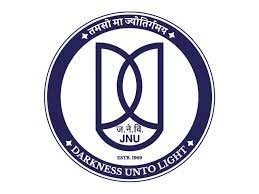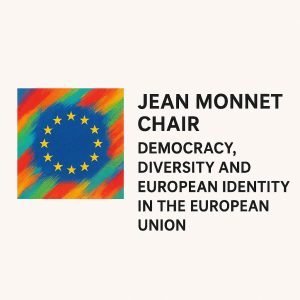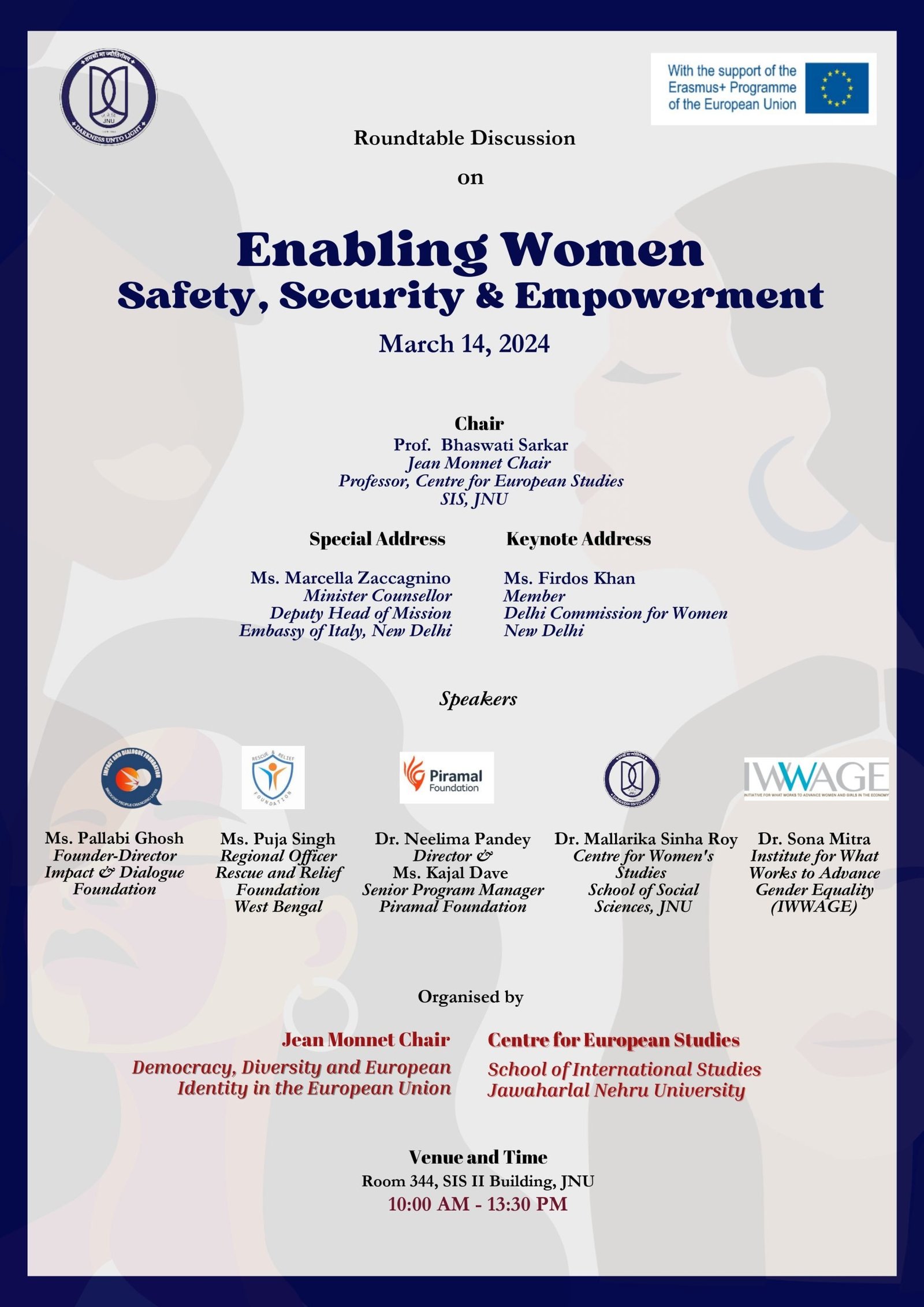
- This event has passed.
Roundtable Discussion – “Enabling Women: Safety, Security, & Empowerment”




Roundtable Discussion
on
Enabling Women
Safety, Security & Empowerment
March 14, 2024
Chair
Prof. Bhaswati Sarkar
Jean Monnet Chair Professor, Centre for European Studies
SIS, JNU
Special Address
Ms. Marcella Zaccagnino
Minister Counsellor Deputy Head of Mission
Embassy of Italy, New Delhi
Keynote Address
Ms. Firdos Khan
Member
Delhi Commission for Women
New Delhi
Speakers
Ms. Pallabi Ghosh
Founder-Director Impact & Dialogue Foundation
Ms. Puja Singh
Regional Officer Rescue and Relief Foundation
West Bengal
Dr Neelima Pandey
Director &
Ms. Kajal Dave
Senior Program Manager
Piramal Foundation
Dr. Mallarika Sinha Roy
Centre for Women’s
Studies
School of Social
Sciences, JNU
Dr. Sona Mitra
Institute for What Works to Advance Gender Equality (IWWAGE)
Organised by
Jean Monnet Chair
Democracy, Diversity and European Identity in the European Union
Centre for European Studies
School of International Studies Jawaharlal Nehru University
Event Report
On the occasion of Women’s Day, Jean Monnet Chair on Democracy, Diversity and European Identity in the European Union, in collaboration with the Centre for European Studies, School of International Studies (SIS), Jawaharlal Nehru University (JNU), organised a Roundtable discussion on “Enabling Women: Safety, Security & Engagement” on March 14, 2024, at SIS, JNU. The objective of this event was to facilitate dialogue with civil society organisations to gain insights into the practical implementation of women’s empowerment initiatives in India. This was undertaken in light of the government’s emphasis on women-led development, safety, education, and employment, and in recognition of the growing importance of gender within the framework of EU-India relations.
Both India and the EU have made significant strides in advancing gender equality and women’s empowerment within their respective domestic contexts. In recent years, India and the EU have intensified their cooperation on gender issues. This collaboration has taken various forms, including joint initiatives, capacity-building programs, and policy dialogues. One notable example is the India-EU Strategic Partnership: A Roadmap to 2025, which identifies gender equality and women’s empowerment as a key area of cooperation. The Roadmap emphasises the need to promote women’s economic participation, leadership, and decision-making, as well as to address gender-based violence and discrimination.
A panel of experts from four organisations was invited to share their experiences working on crucial gender and safety issues. These organisations were actively involved in initiatives such as empowering women through skill development, rescuing and rehabilitating survivors of human trafficking, advocating for women’s economic advancement, and conducting policy research. JNU faculty also joined the discussion, providing academic and research-based perspectives on contemporary challenges faced by women.
For the inaugural session of the event, Mrs. Marcella Zaccagnino, Minister Counsellor, Deputy Head of Mission, Embassy of Italy, New Delhi was invited to deliver the special remarks. Additionally, Ms. Firdos Khan, Member, Delhi Commission for Women, New Delhi, India delivered the key note address. Both women shared personal anecdotes to highlight upon the subtle, daily challenges of being working women in conventionally male dominated fields. Mrs. Zaccagnino noted that while significant progress has been made in women’s workplace equality, subtle gender biases persist, particularly when women assume leadership roles. Although overt discrimination may be less prevalent in Europe than in India, the universal challenge of women needing to outperform men to achieve equal status remains. Ms. Khan shared numerous cases handled by the Delhi Commission for Women, highlighting the alarming frequency of unreported crimes and discrimination against women. Both speakers also highlighted the fact that an empowered woman may still not be assured safety in many contexts. In addition to these various themes, discussions also delved about the concept of empowerment and its relevance to women in diverse situations. For instance, how societal expectations can uplift women, but at the same time can also create a double-bind, leading to the silencing of empowered women when they challenge gender bias in personal spaces. After a thought-provoking discussion, the session ended with a vote of thanks by Dr, Ankita Dutta, Assistant Professor, Centre for European Studies, School of International Studies, JNU.
The first panel included Ms. Pallabi Ghosh, Founder and Director, Impact and Dialogue Foundation a public charitable trust that works to prevent human trafficking and modern slavery, rescue victims, and rehabilitate survivors across India. Ms. Ghosh provided detailed insights into her work, recounting field experiences of rescuing and rehabilitating survivors of human trafficking. Her anecdotes, which included frequent court appearances and visits to trafficking hotspots, shed light on the harsh realities faced by young women. She underscored the importance of fostering open dialogue and intergenerational understanding to address the root causes of violence against women and prevent future occurrences.
The second panelist Ms. Kajal Dave from Piramal Group. Ms. Dave was a Senior Program Manager at the Karuna Fellowship, program by the Piramal Foundation that aims to empower women and girls from socio-economically disadvantaged backgrounds by equipping them with, equips women with tools for personal and professional success. She provided a detailed picture of the vision, objectives, operations and curriculum designed as part of the fellowship for the duration of 23 months. Her presentation delved into the challenges faced by women and and the impact of the fellowship on the fellows, which consisted of over 10,000 + women across different parts of the country.
The third panelist, Ms. Puja Singh, Regional Officer of the Rescue and Relief Foundation, discussed the organization’s mission to support marginalized communities affected by poverty and deprivation. The Foundation provides financial and psychological aid to victims of severe circumstances, including human trafficking, as well as initiating programs for residents of old-age homes and orphanages. Ms. Singh underscored the organization’s goal to ‘broaden the scope of activity to as many sectors as possible and to every state of India so that ‘love’ and ‘care’ reaches every corner of our country and even outside.’ Her presentation delved into the Foundation’s relief programs and initiatives, highlighting notable rescue operations for human trafficking victims. Through personal anecdotes, Ms. Singh offered a poignant perspective on the challenges faced by vulnerable populations, particularly women, emphasizing the scale of suffering and the severe circumstances they endure.
Dr. Sona Mitra, Director, Policy and Research, IWWAGE, New Delhi, was the fourth panelist fo the event. The Institute for What Works to Advance Gender Equality (IWWAGE) is an initiative of LEAD, an action-oriented research centre of IFMR Society that ) aims to build on existing research and generate new evidence to inform and facilitate the agenda of women’s economic empowerment. As part of their work, IWWAGE attempts to shift the evidence base from “How” to “What Works”, and in the course of her presentation, Ms. Mitra delved into the intricacies of their research on female employment in the contemporary economy. She highlighted a significant portion of women in society who engage in a wide range of activities that fall outside traditional labour market categories. Expanding on this, she introduced the concept of ‘care work,’ a domain in which a substantial number of women are involved. Ms Mitra further explored the potential for ‘care work’ to evolve into an independent industry, given its employability scope for women and as a sector that even AI cannot overtake.
The final two panelist of the event were Dr. Papori Bora, Assistant Professor, Centre for Women’s Studies, School of Social Sciences, JNU, and Dr. Sheetal Sharma, Assistant Professor, Centre for European Studies, School of International Studies, JNU. As part of her presentation, Dr. Bora delved into the historical trajectory of legislative actions pertaining to crimes against women. She shared a nuanced analysis of how these laws have both facilitated and hindered efforts to support women, depending on the varied contexts in which women across time and generations have been severely impacted. Dr. Sheetal Sharma, in her presentation, unpacked the concept of gender and its understanding in literature. She delved into the social construction of gender, highlighting how societal norms, cultural practices, and power dynamics shape gender roles and expectations. Dr. Sharma also emphasised the intersectionality of gender with other social identities, such as caste, class, and sexuality, which can further complicate experiences of gender-based discrimination and violence. Moreover, she discussed the evolving nature of gender and how it is influenced by historical, political, and economic factors.
A Question and Answer Session was moderated by the Chair, Prof. Bhaswati Sarkar, in which attending students and faculty not only put up questions for the panellists but also were encouraged to share their own thoughts and ideas on the theme of the event. Prof. Bhaswati Sarkar, the convener of the event, herself reflected on the significance of the event, noting that it marked a pioneering initiative for the department.. She expressed optimism that the positive reception and the growing importance of gender as a focal point in India-Europe relations would pave the way for future such endeavours in the Centre. The event concluded with a vote of thanks from Lyimee Saikia, Research Scholar, Centre for European Studies, School of International Studies, JNU, in which she thanked Prof. Sakar, the faculty, the panellist and the attending audience for their contributions to making the discussions profoundly impactful.
